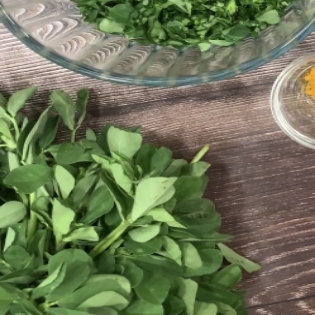BENEFITS OF METHI

Methi is also known as fenugreek leaves commonly. Fenugreek is an herb in the same family as soy. People use fenugreek seeds, also called methi seeds, as a spice, flavoring agent, and supplement. Fenugreek (Trigonella foenum-graecum) is a plant that stands around 2–3 feet (60–90 centimeters) tall. It has green leaves, small white flowers, and pods that contain small, golden-brown seeds. Fenugreek seeds and powder are also used in many Indian dishes for their nutritional profile and slightly sweet, nutty taste.
Nutritional Count Of Fenugreek Leaves ( 100 G )
- Calories – 49 kcal
- Carbohydrates – 6 g
- Protein – 4.4 g
- Fat – 0.9 g
- Dietary fiber – 1.1 g
- Iron – 1.93 mg
Promotes Weight Loss
- Fenugreek leaves too are packed with antioxidants and nutrients that help rev up metabolism and promote fat burning. They are also packed with dietary fibres. Fibres take the longest to break down and digest; this helps induce satiety. If you feel full, you would naturally binge less on other fattening foods. Fibre adds bulk to the stool and helps push food through intestines; this ensures smooth bowel regularity and digestion. A good digestion is paramount for healthy metabolism and weight loss. Fenugreek is rich in galactomannan, which is a polysaccharide that triggers fat breakdown and sugar metabolism in the body.
Controls Diabetes And Sugar Levels
- Fenugreek may aid metabolic conditions, such as diabetes. The high fiber content found in fenugreek powder or seeds could also be beneficial for supporting blood sugar control, even in people without diabetes. Fenugreek significantly reduces blood sugar levels after eating in people without diabetes. Fenugreek is often used for blood sugar control and to help prevent diabetes because it seems to improve insulin sensitivity.
Lowers Cholesterol
- Blood lipid levels change a lot when you eat fenugreek leaves every day. So, this herb can help a lot for people who have problems with their lipid levels. So, it lowers cholesterol, triglyceride, and LDL levels by raising HDL levels. For a great effect, put about 100 grammes of fenugreek leaves in water at night. The next morning, strain the water and drink it.
Lowers Heart Problems
- One of the most important things about fenugreek leaves is that they help stop the body from making platelets. So, it helps lower the chance of blood clotting in the heart when it shouldn't. Like many other herbs, the leaves of fenugreek are full of strong antioxidants. Kasuri Methi also helps keep other antioxidants made inside the body from getting hurt in any way. They also help protect the body from a number of long-term diseases.
Keep Bowel Problems In Check
- Dyspepsia and a liver that doesn't work well can both be helped by fenugreek leaves. It also helps stop problems with the stomach and the intestines. People often use fenugreek leaves to help with digestive problems like gastritis, constipation, stomach upset, etc. Fenugreek leaves have a balancing effect on the lipid levels in the body's blood and can help prevent problems like atherosclerosis. Fenugreek leaves is good for diabetes. Fenugreek leaves have been known for years to be the best way to lower cholesterol, triglyceride, and LDL levels, which helps fight diabetes symptoms.
- It is true that these bitter pungent leaves are not so popular among kids and fussy-eaters. But once you develop a taste for it, there is just no looking back. From parathas, broths, pakodas to saag, there are so many places you can sneak in these lovely winter greens. Methi leaves or fenugreek leaves are a storehouse of health benefits too. They are packed with galactomannan, which plays an instrumental role in combating the risk of heart disease as well diabetes. This compound helps in slowing down blood sugar absorption. It is also a good source of soluble fibre and is excellent for digestion.


